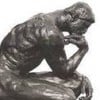How did you become an atheist?
I would be interested to hear personal stories from atheists or agnostics about how you came to be a non-believer.
A summary of my personal story:
I was born and raised as a fundamentalist Christian and considered myself to be one until about the age of twenty. My transition from Bible believing Christian to non-believer started when I began to question why I believed what I did and if those reasons were valid. I finally got the courage to challenge my preconceptions and I began to study other viewpoints which led me to conclude that I could no longer say with conviction that I believed in God or the book that was supposedly authored by him. I discovered that studying science and philosophy is much more interesting and fulfilling than reading an outdated bronze age book of myths written in a time when ignorance and fear were prevalent in the primitive culture of the time.In my part of the world, we haven't been limited/hindered to study science because of religion. Only fundamentalism does that. However, grats on thinking about it critically.
Um, well, I didn't. But then I can't really claim I'm a "believer" in the sense that most "believers" are. I just think there's too much that can't be explained, that is lacking in scripture, that is unexplainable to humans, and so much more. That sort of puts me in a different group [I think}. I certainly don't feel much of a sense of community with most believers or atheists, that's all.
Interesting. I myself try not to assume the supernatural regarding the mysteries of the universe. Attributing the supernatural to the yet to be explained has proven to be a premature assessment in the past in almost every case. No reason to think that trend will change.
I believe in a Divine spiritual entity (possibly more than one) or energy(ies), but I don't believe in God per se. I don't believe in anything in the Christian Bible, even though I was a student of it when I was young, as a practitioner of the Catholic faith. I became an 'agnostic', I guess, because my sincere pointed questions were never answered by anyone - parents, teachers, clergy, fellow churchgoers. and I had a lot of questions. too often I was told to basically shut up and have a little faith. being an analytical sort of person, this didn't set well with me. as I grew up I sought answers on my own, from which more questions sprang forth. I guess I stopped believing in God when I saw how many awful things there are in the world that he ignores.
"Just have faith" is a typical response from believers when the really hard questions are asked. I don't know how or why, but somewhere along the line, believing in absurdly implausible things without evidence was deemed a virtue. Go figure.
I’m an ex-fundamental Christian nut that has become a happy Agnostic. My de-conversion from Christianity took place over a period of two years after traveling throughout Europe, Asia Minor and the Mediterranean Islands. My biggest shock came after a visit to the British Museum in London, England where I viewed cuneiform tablets, Papyrus, walls of Hieroglyphics, Steles and many artifacts that serve as evidence that the stories were hijacked from previous cultures.
When I was in Rome I discovered that there is absolutely no evidence outside of the four Gospels that a man known as Yeshua/Jesus historically walked on this earth. Christians like to cite Flavious Josephus writings as factual evidence but most Christian Scholars admit that Eusebius who was an early Church Father is responsible for the forgeries in his works.
Practically every word put into Yeshua’s mouth and every Miracle attributed to him can be traced to other savior-gods who were mostly mythological and worshipped up to thousands of years earlier.
They:
Were born of a Virgin
Were baptized by a forerunner
Walked on water
Turned water into wine
Fed a large multitude with a little food
Brought individuals back to life
Had twelve followers or disciples
Observed a Eucharist
Were crucified by hanging on a tree
Rose from the dead
Ascended into heaven
…and will return one day to end the world
No one has ever proved the existence or non-existence of a God up in the sky even though we know that much of what is prevented for him is non-sense.Spot on! The "godly" qualities are constant across the bible and quoran too.
What they all describe, or attempt to make sense of, is everything they feared and all that was unknown.
The Greeks did it a bit differently to some, using the gods symbolically to describe the aspects of the human condition quite well, with a variety of entities sharing the traits so that they can be clearly associated with a particular entity.
Recognizable psychological aspects such as anima and animus are personified in such entities as Aphrodite being the anima in men as described by Jung.
The bible and quoran, teach that they are to be taken literally, which is why it never make sense when viewed in its entirety.
The text is very threatening in another way to the mythological gods. The whole thing becoming a one god/man band that man has to pay homage to get the big prize of not being tortured forever, having already lost his after-life because he missed following impossible laws.
Those who say science agrees with religion need to take a good look at not only all the sciences, but psychology and medicine as well. More informative than the few things they follow written by religious scientists who have been discredited by their peers.
"Well god made the big bang" won't wash.
The Dark Ages in Europe lasted almost 800 years, wherein the Church fought against Scientists which impeded progress and kept the world at a standstill. Many of the scientists were imprisoned and put to death. A good example is Copernicus and Galileo.
What’s sad is that Christians don’t know anything about world history and don’t want to be told the truth. They believe that the Buybull is a book of world history wherein Gawd said it, they believe it and that settles it.
When I was having doubts about the veracity of Christianity, I began doing a lot of research, and like you, I also discovered the striking similarities between Christianity and the pagan religions that preceded it. This discovery was only one of the many reasons I rejected the validity of the Bible. There certainly isn't anything particularly unique about Christianity in my opinion.
I never believed in god since I was very young, I was an atheist till the age of twenty four when I got enlightened in the middle of the Atlantic Ocean.

I was allowed free choice by my parents, something that I thank them for, they did not impress anything upon me in a religious sense, and let me choose, and I simply chose the logical path. I guess I just grew into it.
my story is somewhat similar to your own.
i was also born and raised fundamentalist christian, even when i moved to my dad's house in high school and he didn't go to church, i still found ways to get there. and read my bible in between classes and scolded my jack mormon friends for cursing. LOL! boy, how things change.
well in youth group i told my pastor that i didn't "Feel" that feeling anymore. he said that i had just gotten used to the feeling and so it didn't feel as moving. i just couldn't accept that, i began to search for answers beyond what i was raised to believe. i made friends that were *gasp* pagan. i revisited my interest in astrology and tarot cards and branched out from there. i stopped limiting myself in a tiny box of a belief system and allowed my beliefs to grow from the spiritual foundation laid. so i do still pull a lot from my knowledge in christianity, though my beliefs about the bible and the characters in it have changed drastically.I was born in a Catholic country and raised by a very "strange" parents. My father was an agnostic. My mother - spiritual, but not religious. We celebrated Christmas and Easter and I loved to visit old churches. I loved the smell of incense and candles, and the sound of choir and the organ music.
When I was 12, I started reading philosophical books. I asked some questions at the Sunday school and was thrown out. My mother had to report to the priest. I was a danger to the innocent minds. This made me THINK and I never went back. Instead, I read more philosophical books and learned science. At 14 I was a fully formed atheist. My conviction never changed. Instead, it is stronger than ever.
I studied philosophy and comparative religions. I love the ideas of Buddhism and the philosophy of Taoism.
I'm not sure I've ever made the decision one way or the other.
I can tell you my husband became an atheist after reading the Bible. He was also a fundamentalist Christian in his late teens. He decided it was his duty to read the Bible from start to finish - and by halfway through he realised it was full of contradictions and didn't reflect what he'd been told.That's interesting. You know, there is a quote by Isaac Asimov, the famous author and biochemist, where he stated "Properly read, the Bible is the most potent force for atheism ever conceived."
There is no right answer to this, some people are just born that way, while some because of situations that affect changes in their circumstances and outlook on life. The chief archetec of the evolutionary theory Charles Darwin entered university to be a theologion, but while at college swithed to study natural history, biology among other scientific disciplines. He wasn't born or grew up that way, something happend that changed him. Some people became angry with God when trying circumstances such as the lost of a loved one affect them, they start to question if there is a loving God why good people had to suffer or die. Remember also, that the chief archetec of Atheism is Satan, he has always wanted to replace God and take the glory of creation for himself. He teaches men to justify a unique creation without an intellegent designer, a creator, Satans greatest trick yet. The thing we must remember is that time and chances happened to all of us, rain falls on the good and the bad also, no need to blame God, or dispute His existence when things go wrong.
One of the most common accusations made against atheists is that they are mad at God because they suffered some misfortune in their lives. This wouldn't make them atheists, this would make them angry theists. An atheist is someone who doubts the existence of a god. You can't be mad at something that you don't believe exists. I can't speak for all atheists, but I know in my case the reasons I doubt the existence of a god are purely intellectual in nature and not at all emotional. My life, for the most part, has been good. I have no reason to be bitter.
You dismiss all of the thousands of gods men have invented throughout history. I don't imagine you are angry at Zeus or Thor. You just don't believe they exist, and for good reason. I just take it one god further than you, that's all.I use to believe in god, but I don't no more. What happend is that I saw my grandfather suffer and be in so much pain, and how all of the family was.. If there was a god he could have made him not suffer like that. Just many crappy issues that lead to it. Also, I believe in science over god.
Kenny,
I’m gonna give you the benefit of the doubt that it was not your intention to be offensive with your Satan/architect remark. Less than admirable behavior recently from some members of both camps aside, the atheists I know are deep thinking, considerate people, who respect others. Much, much more so than the Christians I grew up among.
Nothing awful happened to me growing up, aside from Southern hypocrisy, bigotry and homophobia. I grew up going to church every Sunday, Sunday School, Sunday School teacher. There came a point where I had to admit to myself that as much as I wanted to believe it all, I just didn’t. Probably never had.So atheist are influenced by the devil?--Just because we can't bring ourselves to believe that snakes talk, virgins give birth, burning bushes speak, and the Red Sea can be parted with a staff. These things are all absurd and if believers were brave enough they would stop believing them too. Instead, they would rather vilify us because of their weakness.
Furthermore, there were two days before the SUN was created. God callously drowned the entire population of the earth, except one man, and his family. A man built a boat capable of holding millions of animals...for weeks! A man lived to be 900 years old. Where is the logic?
There is just one absurdity after another, and believers think it's evil directing our minds when we reject this nonsense. THERE IS SOMETHING CALLED REASONING!
And, finally, I'm suppose to praise a ZOMBIE who raised himself from the dead. I am to worship him by, symbolically, drinking his blood and eating his flesh. Wow! this makes so much sense(and we're Satanic, huh?)
I cannot abdicate my mind, and give in to fear. My mind is all I have. By the way, there is no Satan. That was all made up. An imaginary being cannot influence anyone or anything, just as this imaginary God. To think there are Gods and Devils(and dragons) is delusional.Rather interesting that God says he tempts no man,yet kicked Satan out of heaven to keep him from causing further problems there and sent him down here amongst unsuspecting humans and then remains silent until its time to punish them.
I am neither a follower nor an atheist.I love to be the way I am and no one can take away my freedom of thinking from me.Yet, my observation points towards the intelligent design of both the universe and human.
Like everyone, I was born that way.
Religion is indoctrinated upon the children of this world.
Organized religion relies on this. If it were illegal for children to be subjected to the 'teachings' of religious groups until they were of voting age, religion would be no more.
Getting into the minds of our youth before they have the ability to weigh the arguments themselves is morally dubious.I agree. Taking young impressionable minds and filling them with religious notions before they are able to think critically is nothing less than brainwashing. There was a Jesuit motto attributed to Francis Xavier, the co-founder of the Jesuit order, that states "Give me a child until he is seven and I will give you the man."
I don't consider myself one way or the other as I do believe there is a higher consciousness, that is part of each human being. to indoctrinate young children is wrong. they are our children, but they are also separate human beings. many children are much smarter than adults give them credit for.
I have a minor degree in comparative religions and after much study, I came to the conclusion that 'religion' can be mans greatest enemy. but I do believe there is a spiritual nature in our lives and our world.Did your studies in comparative religion lead you to the conclusion that there are striking similarities between the ancient pagan mystery religions and the monotheistic religions, like Judiasm and Christianity, which indicate undeniable instances of 'borrowing'? I am interested in getting an educated persons thoughts on that subject matter.
If religion is indoctrinated on the children, who indoctrinated the first child?
Are you the first child in your city born as an atheist.

No, at that time in this country the vast majority of kids born were born atheists.

So lucky kids.I think after the break up of USSR the religious situation did not change much in your place.Is it so.
Not sure we were so lucky.
 Being indoctrinated with socialism/communism instead of Christianity/Islam/Judaism does not make much of a difference really. May be a bit easier to see the idiocy of it, but then looks like for some adults it is a bit harder
Being indoctrinated with socialism/communism instead of Christianity/Islam/Judaism does not make much of a difference really. May be a bit easier to see the idiocy of it, but then looks like for some adults it is a bit harder 
Misha, speak for yourself

I was born in the same country as you were. I was born an innocent God's creature, a God's gift to my parents. I was MADE an atheist by that country, by school in particular But my atheism was with the tongue in the cheek. I was wondering, if God does not exist, why people around were saying all the time, like "thanks God", or "God forbid", or "Glory to God"....and the like. I was told that those were just expressions, without meaning. Really? Well, may be....
But my atheism was with the tongue in the cheek. I was wondering, if God does not exist, why people around were saying all the time, like "thanks God", or "God forbid", or "Glory to God"....and the like. I was told that those were just expressions, without meaning. Really? Well, may be....
I am still secular.... but not atheistic
wouldn't all kids be born atheists? As a baby you have no pre conceived notions of anything so why would be believe in God?
Everybody is born atheist. It isn't until parents start putting ideas in your head that religion kicks in.
Don't take this offensive, its true. Why are people in America Christian? Because they are born in America! Why are people in Iraq Islamic..? Because they are born in Iraq! Why do people in a small town in West Africa worship a mountain? Because their parents do so.
That is why people say religion is a meme.
All people are born atheist. When they are old enough to understand the concept of theism, they usually encounter some form of it. Then they have to decide whether they believe in it or not.
I don't believe all people are born atheist, because to be atheist is to determine that there is no God- to have already made a decision.
I believe people are born agnostic.To be agnostic is to know about religion and not make up your mind yet. But there's an earlier stage, when you don't believe, not because you are skeptical, but because you've never even considered the possibility.
What you have to remember is that before someone introduced you to the concept of a god or gods, you didn't have that concept. So it was not that you weren't sure if the concept had validity in the real world or not -- you didn't believe in a god because the idea of a god hadn't even occurred to you yet.The problem with this statement is that it is unverifiable. How can we know that infants don't have a concept of god? and not just the Christian god?
I know from my personal experience. I had never heard of religion of any sort, when I was introduced to the idea when I was four years old. I remember being quite fascinated with the idea of grown people talking to someone who was not there in the room with them and that nobody could see. The idea of a supreme being had never occurred to me before.
But you were four then. Do you know the brain actually sheds a lot of neurons at a very early age? Neuroscientists speculate that that's one reason why we can't remember our prenatal moments. (At least this is what I understood from what I've read.) The point is, you cannot verify something that you cannot repeat. And, there is growing evidence that distant memories are not recalled, but reconstructed instead. It is possible that what you think you remember may be a product of what you believe in right now.
It's up to you whether you want to become a beliver or not
Well, yes and no. It's true that a person could simply make the conscious decision to join an established religion for practical reasons. Fellowship with others, a support group and social acceptance are some of the motives that might prompt such a decision.
But the spontaneous, emotional experience of being a believer is not open to volitional control.
It may be up to you whether you get married or not. It is not up to you whether you fall in love.Oh, I'm in love with every other woman around. It is definitely not up to me!

I hope no one will think it impolite if I don't respond to every post. If you have a question or comment that you would like me to respond to, just put "What do you think David?" or something to that effect so that I will be sure to take notice and respond. Otherwise, I will look into the thread sporadically and comment or respond to posts that I find the most interesting.

I agree with those who have said we are born atheists.
I was born an atheist, and then my parents loaded my mind with Christianity. Another concept that we are not born with is the concept of deceit. We trust everything we experience. We believe what we are taught. I had no reason to mistrust my parents. If they said it was true, then it must be true.
I existed in that distorted perception until I was about seventeen. That's when I really broke from Christianity and proclaimed it to be not only false, but psychologically and socially harmful. Since then I've involved myself in research on religion, theology, mythology, history, and other related sciences in a quest to enrich my perception of truth. I've found that the real world is infinitely more beautiful and intriguing than the stuffy, limited, dead world of religious hypnosis.Your past situation sounds very similar to mine. I guess there are two types of atheists; those who were never indoctrinated and thus, have always been atheists, and those who were indoctrinated but later broke free. You and I are the latter.
Yeah, thinking certainly is antithetical to faith - in my opinion.
Your opinion doesn't jibe with most believers' experiences then.
As much as I disagree with Dawkins, I do kind of like his "atheism scale," defining the strong atheist as one who knows there is no God. As we're born having drawn no conclusions regarding the existence of God, that supports my view that we're born agnostic, and whether or not we become atheist or believers depends on our later experiences and our education.
(What I think is odd is the double standard. A child raised Christian by Christian parents is "brainwashed," but a child raised atheist by atheist parents isn't? Either way, to me it's indoctrination.)
I had been a fairly devout agnostic for several years I have to admit for all the wrong reasons- intellectual and spiritual laziness plus no small amount of teenage rebellion. I surmised that because we can't know for sure in this life if God exists, there's no point in trying to find out to the best of our ability. Taking an introductory philosophy class in college forced me to abandon that position. If I wanted to pass the religious and moral philosophy units, I had to attempt exactly what I'd written off as pointless.
I know this isn't exactly an answer to this question, as I'm back to being a believer, though according to Dawkins, I'm not a strong theist. I retain a smidge of agnosticism now for the following, much better in my opinion, reasons:
1. I still can't honestly claim to know 100% that God exists. I'm only convinced beyond a reasonable doubt.
2. If my faith can't withstand rigorous scrutiny, it's not very good, strong faith in the first place.
3. I think it's better if you're not sure God exists or if there is any reward in Heaven, but you continue to love God and try to live like a citizen of Heaven should anyway. The devotion and the motive behind living as a citizen of Heaven should is purer that way. You're not doing it for a reward.
4. Acknowledging there is a possibility that I could be wrong keeps me humble and on a quest to learn more.I consider myself a "weak" atheist, or in other words, I don't claim to "know" that there is no being that created us. I simply consider all of the arguments put forth for a god's existence to be inadaquet. Actually, atheism and agnosticism aren't mutually exclusive. One can be an atheist via agnosticism. This is what is referred to as agnostic atheism, which is what I consider myself to be. Atheism in that sense is not a position of certitude about the non-existence of a god. Although, I would say that my atheism is stronger in the case of Christianity or any of the other world religions, I would say that on the existence of an as yet undefined creator, I would say that the scale tips closer to the middle of the agnostic spectrum yet still within the bounds of atheism. Are you familiar with Russell's Teapot?
http://en.wikipedia.org/wiki/Russell's_teapot
Whether it is Christian, atheist or any other belief system that is inculcated into young childrens minds, I consider it all brainwashing.
I also acknowledge the possibility of being wrong. I just find the arguments put forth by theists to be unconvincing.
Ooo. You know what I think about this, david.

I think I might have an idea of what you think about it.
I become an atheist whenever I have to talk to anyone like atomswifey.
- sneakorocksolidposted 16 years ago
0
When people are born they can suffer an intestinal virus which if not treated promptly can lead to a state of confusion known as 'California'. If allowed to progress unabated eventually they could be crippled for life known as 'Massachuetts limping brain syndrone'. This is the worst case of atheism ever know to man, for women it's solely based on moon phases. Does that help?
Valerie,
You write: "(What I think is odd is the double standard. A child raised Christian by Christian parents is "brainwashed," but a child raised atheist by atheist parents isn't? Either way, to me it's indoctrination.)"
But what about child raised by no one? What about a feral child? Would he necessarily invent a god? Or would the absence of the idea mean that he did not believe in a god.
There's a difference between "disbelieving in a god" and "not believing in a god."Okay, that is presupposing that God is invented, and while you may believe that, I don't think you know that for sure.

Agnosticism means, strictly speaking, "not knowing." The absence of the idea would make the hypothetical feral kid a kind of agnostic, because even if it never occurs to him or her to find out, the kid still doesn't know.
And it may be that a feral kid would still believe in God, a predisposition to faith being genetically hardwired into some.i think Man invented God so he wouldn't feel alone. and long before Cro-Magnon Man (Early Modern Human) ever walked the Earth.
Valerie, I probably should not have said "invented". I wasn't trying to be biased either way. I was just trying to draw your attention to the fact that most children learn about the god in their culture the same way they acquire language. No caregiver, no language, no culture. No religion.
People tell their children about their god, because they themselves realize that if they don't teach the child about religion, the child will not automatically know.
It's true that "agnostic" literally means "not knowing." But let's face it: nobody knows. Not ahteists, not theists, and not agnostics. So when somebody says: "I'm agnostic," he doesn't just mean I don't know. He means, I prefer to remain undecided.
Children who are not told about religion don't go around saying: "I don't believe in God." They don't even think that. It just doesn't occur to them. So the situation is not completely symmetrical.LOL Mark spent an eternity trying to explain this to religionists and finally gave up. They just don't get it, period. It comes with the territory.

That there may be a genetic predisposition toward faith or religiosity rather disproves the idea that religion is all nurture. Some people are naturally hard wired to believe in God, so it is entirely possible that someone who was never told about religion might have religious thoughts anyway.
Dean H. Hamer and Andrew Newberg wrote a few books about just this.
I agree Valerie. Carl Jung, Maria Luise Von Franz et al. thought we are all hardwired that way.
Plenty of empirical evidence to support a theory of a hard wired "Religiosity of soul" in other medical theories.
Say the same thing about homosexuals and they say the opposite.

Pretty much the same reason you are OP. However, I find science terribly boring, save for Astronomy and Geology. I find religion quite interesting. It's a similar love like that of Mythology.
However, believing in something enough to prove or disprove it in science is essential. So, faith in some form, religious or not is also essential...
Faith is necessary for 'fact.'I enjoy studying some of the sciences. I still enjoy learning about religion even though I'm not religious. I find it very interesting.
I'm not sure I agree with you about the faith in science statement though. I think there is a vast difference between believing that reality can be turned on it's head occasionally through miracles without any evidence whatsoever as opposed to believing that this or that observation will indicate the existence of this or that phenomenon as in science.
Well, that's why I mean having faith in something that CAN be, perhaps, scientifically proven-that's me being vague. A theory starts with belief in the plausibility of proving or disproving something (but definitely not a belief in a miracle which just happens rather than has scientific backing).
I just think that as an atheist I see belief challenged yet to SOME degree belief is necessary even in science. Not religious per say, but faith is vital for fact.
Iono, always a concept I thought about.
(>;_ > <(;o;<)
> <(;o;<)
I was raised nominally Catholic, with just a bit of exposure to Catholicism (a couple of years of CCD) and evangelical Christianity (next-door neighbors; very scary). My parents were/are essentially agnostic, with my father very much against organized religion. They taught that it was most important to be a good person, and set a good example.
I considered myself an agnostic/"soft" atheist formally but recently decided to convert to (Reform) Judaism, mostly because it reflects my general sentiments about the need to be a good person. It allows for my skepticism/agnosticism about God.
That said, in my experience, atheists/secular people tend to be more moral than the religious, especially evangelical Christians, so I don't think children need to be raised with a religion to turn out ok. Often religious dogma is very much counterproductive.I don't believe that there is no God. Maybe I don't have any right to post on this thread. I, also, don't believe that God has been defined by any human. I don't believe in religion, since it is so judgemental. I think it is ridiculous to believe that God is a big guy sitting on a throne in heaven tallying up peoples' "sins". I believe in the human spirit. I believe we all have a little God in us, all.
I think the "little god in us" has a lot more validity than seeing all things through religion.

But you know, believers can align this statement with christianity like so: "Of course. That is because God created us in His image."
I like this one, a lot, too!

PS, you definitely have the right to post on this thread.
I was brought up in an Anglican family- not particularly religious but observant of high days and holidays as the saying is. I went to church regularly through my school and scouts. I started to realise that the most pious believers were often the most judgemental people. I was 13 when I decided to read the Bible. I was still 13 when I realised that I didn't beleve most of what I was reading. I do not feel an urge to look outside of humanity for comfort or blame. I have never felt a need for supernatural intervention. If things suck it's up to me to change it, or at least change the way I'm reacting to it. If things are good I'll take some credit and enjoy it.
- Scott.Lifeposted 16 years ago
0
Well i gotta say after the last two days of forum posts I'm giving it some serious thought I haven't seen so much madness being dealt out in the name of God since the last crusade. Help us all if the fanatics take over there won't be anywhere safe for the tolerant Christians to go.
One question for the atheists: Without a belief in God how do you justify moral laws? What's the source of your ethics?
Or do you admit that religion, in its good and evil forms, has somehow managed to influence modern secular society. So we may throw off the shackles of religion and keep the moral codes? See where I'm going? There needs to be a master plan to give rhyme and reason to this multi-splendoured madness we call life. But I am willing to admit that with so much that we dont understand I could still be wrong.
But so long as the Bible is true, then there is a God who deserves our worship, and prophecy fulfilled is a great evidence.It's kind of a sad state of mind to do good things only becuase God wants you to, or because you think you might miss out on a reward or even be punished. Who is more moral, someone who does something because the Bible says (add appropriate scripture here), or because of sincere concern for that persons well-being?
I justify ethical actions by looking at the benefits of being ethical as opposed to unethical. You have to think not of the immediate benefits of an action, but rather, the long term benefits. Taking advantage of someone or selfishly withholding resources may be beneficial in the short term, but in the long term, you alienate youself from those who could potentially help you at some point or even create enemies where you had none before. The advantage of the long term benefits outweigh the short term gains. It's a very simple concept.
If I understand you correctly, you seem to argue that secular ethics are taken from scripture. However, I would argue that it is just as likely to be the case that scripture got its morality from human reason, not from a deity. How else could we know that the golden rule is a good moral precept if we didn't already posses an ability to determine whether something was a good moral precept?Human beings who haven't been seriously damaged by bad experiences like war, lousy parents, crushing poverty etc etc are capable of empathy, generosity and concern for others without any moral codes. Moral codes are really only needed for those have been damaged in some way or are just genetically insensitive to their fellow creatures. This is not a recommendation for abandoning moral codes since damage is the norm.
This is one of those odd good questions I see from believers from time to time. Asking it is justified, and the answer is not self-evident.
I think usually when people ask this question, there's two parts to it, even if they aren't both explicitly asked. "If there is no God, where does our morality come from?" and "If there is no God, why should we be good?"
The answer to the first is that our morality sort of trickles down in several steps. The most immediate answer is that we pick it up from our culture. It mostly agrees across cultures, murder, theft, and rape are consistently considered wrong, we need those rules for society to survive, but finer points disagree... what's appropriate mode of dress, what constitutes an "honorable" profession, sexual practices etc differ. Not all cultures are the same.
Cultures get their morality from refining applications of empathy over time. When we see someone who we consider as part of our "group" come to harm it causes us anxiety. Someone else's suffering is unpleasant to us and so our instinct is to try to alleviate it. This is generally stronger the closer the person is to us, and can be insignificant to people who we consider sufficiently alien. That's why the efforts to "dehmanize," opponents in political and social struggles.
We evolved this empathy because our ancestors were not smart enough (and we are probably still not smart enough) to reason out and optimize the consequences of our day to day interactions with other people, so instead we developed rules of thumb we could apply intuitively without ever understanding them. Thus empathy, it's usually to our own benefit if the people around us are happy and healthy, and we have an instinct that pushes us towards that which we have no need to understand.
It's the same reason poison has a tendency to taste bad. Our ancestors didn't have chemistry, they needed to want to avoid poison and want to eat not-poison, and it had to be on sub-intellect level of desire and discomfort.
As why we should bother being good, really that is like asking why we shouldn't switch back to lead pipes. There's nothing in any holy text that instructs us to use non-toxic materials to transport our drinking water, or to us a mixture of metal and concrete to make large buildings strong enough to be safe for us. We should strive to be "good" for the same reason we have any inclination to do so: Being "good" is good for us.
No justification of ethics outside a belief in a god are needed as there is no difference.
There are thousands of logical reasons for ethics and morals and religionists do not have ownership of good behaviour any more than others.
Many non believers are very moral because they understand natural process to include what many call kama and more practical people recognize generally as getting back what you put out.
One only need a bit of scientific thinking to see that which hurts us hurts others and visa versa.Having a belief in god is irrelevant.
I'm Not Sure whether I'm an atheist or not...

On one hand there seems to be a good living to be made out of putting One Dollar into the collection plate and taking Five Dollars out....
But then I have to question why there are never Ten or Twenty Dollar notes in there?Thanks for the joke. Laughing my way to bed after writing 3 hubs.



David - thanks for the interesting question. Here's my story:
I was brought up Church of Scotland which has infant baptism but doesn't let you join as a full communicant until late teens. When that time came:
My conscience wouldn't let me join purely for social reasons. I had to be sure I believed. So I looked, read, listened, talked, thought, prayed and waited. And waited. And did not believe. And did not join.
And just as suddenly and magically as had happened all those years ago with Santa Claus, God disappeared. And with him went Heaven and Hell and all the angels and archangels. And the devil too.
It was a great feeling of relief and freedom to realise that I could let it all go and get on with my life. I've never looked back and have no regrets.
(The italicised chunk is from my "Jesus, God and Santa Claus" hub, which tells the full story, from earliest memories).Great post. I'll have to check out that hub.
Yup.
In my case, though, I came to the conclusion as a young child that Santa could only be magical because he was Jesus.
When I learned that the "Santa Story" was a white lie told to help children remember to be good, I lumped Christianity as a whole into the Little White Lie category.
Regarding ethics and morals: All people have an innate capacity for compassion and empathy.
It is not a religious condition, it is a human condition.It is not a religious condition, it is a human condition.
Exactly!
- Will Apseposted 16 years ago
0
When I was at school in the UK we had Religious Education as a set subject. Sometimes we had a priest, sometimes a vicar. At other times we had a purely secular reading of the bible. I remember one teacher explaining the apparent miracle of the parting of the Red Sea by saying it might have been a memory of a rock fall blocking the River Jordan at some time, which in turn gave rise to the parting of the waters myth.
I never remember anyone trying to convince that God existed. I never remember any of my friends ever talking seriously about faith or anything related. There was a fringe group of Christians (a very small number). Nobody bothered them about their beliefs and they never bothered other people much.
Religion was more or less a non subject.
At the same time I enjoy classical music including religious music and feel I understand something of the positive side of the religious experience. I certainly would never attack Christians for being Christian.Very interesting story Will. I like the fact that people seem to keep things to themselves where you are. I wish it were the same here in the US. We have people who will knock on you door and proselytize. I live in a town of about 10,000 and we have about 30 churches. Not a day goes by where I don't see a billboard, hear an advertisement on the radio, or read an ad in the newspaper for one of our local churches. I feel very out of place here. Keep in mind though, I live in the Bible Belt. It is probably not the same in other parts of the country. What's strange though is the fact that, unlike where you are, teaching anything having to do with religion is forbidden in our schools.
"All thinking men are atheists" - Ernest Hemingway
Earnest: Why do you think we hear so much about atheism, but not so much about humanism? I don't personally know any atheists who are not also humanists.
Me either. Some religionists here distort the meaning of humanism as you will see.

As for me, I'm just plain too philoso-fickle. I use my mind rather than blind faith as a guide. Surely, it is better to acknowledge one's ignorance, than to accept ignorance as knowledge. The greatest obstacle to discovery is not ignorance — it is the illusion of knowledge. It is what we think we know that keeps us from learning.
Why, I might ask, would a supreme being foster intense interest in something as puny and insignificant, in comparison, as human beings?
It is as if you or I, as supreme fish terd gods, expressed everlasting admiration and concern for newly deposited fish terds on the bottom of a lake. Why? I say just ignore the filthy bass terds!Very well put dhuett. I liked the humor as well.
I was brought up in a fundamentalist household, and rebelled from the severity of those harsh, limited and judgemental beliefs. I rebelled early, but lately I've begun to question atheism as valid.
I think there's something else; not my upbringing, which was counter-productive of belief, if anything, but my own sense of the numinous is rising within me, getting me to look outward and elsewhere for answers science doesn't have (yet, or maybe ever).evening ernest.. and good mornin too. running to fast to get out of the house this AM to see your good mornin so Good Mornin.
I think that I have created some stuff with some of my big bangs when I was younger and I'm just meWell stated ionerice, Many would like to halt science still.

I just discovered a quote I'd like to share with you. It illustrates yet another reason why I prefer to shun most modern religions.
It appears that as places of worship fill up, so do prisons. Wars too seem more likely on borders where religious beliefs clash. Doped up on religion, people seem much more willing to kill and die in the name of their Gods, than these same people for the sake of their country alone.
Now for the quote:Thanks for asking!
I woke up one morning, saw the sadness of some of the religious fanatics in the forums and thought.... "Ummmm maybe the lions knew what they were doing afterall."
- thetruthhurts2009posted 16 years ago
0
There is no such thing as an ex-Christian! "Either you weren’t really a Christian then or you're not really an atheist now." I wrote on this just a couple of hours ago.
Okay man seriously, I'm not amused by your apostasy. Good day.
I would not expect you to be amused by much at all!

Sounds like a case of not being able to defend the premise.
OMG we missed your writing
 Perhaps it dropped off the site for containing irrelevancies?
Perhaps it dropped off the site for containing irrelevancies? 
I was as many people born as an atheist.
i was raised with the beleive that religian, any religian, was just a bunch of B.s.(i am sorry to offend christians here)
Now that doesn't mean i don't have any values, i know the difference between, right and wrong, between good and bad, But to say that all good things come from a "God" well, sorry they've lost me there. Often i ask myself, if there really was a God, why would he bring so much suffer in the world? If there really was a devine, why would "He" let people starve to dead?
And if there was a God, where would he be? Heaven, tell me where is heaven? How can he control everything. Now i am not only speaking about christianety here, also for jewish and muslim people. Why oh why are those muslims always fighting in the name of god? Doesn't islam mean peace???
Everybody has it's own values, all people(almost)now the difference between right and wrong, all people can do good, all people can help out. The "God", people are referring to is something that is within themselves.
Thanks and best regards.
steffer*drive by post about how being an atheist is wrong, and how atheists are stupid. I could be getting up, and eating breakfast; or checking out other things, but I'm not. I am a masochist, whose only pleasure in life comes from acting like a complete twit in forums with subjects that I don't like.*
The great "George Carlin" opened up my mind, God bless him=)
I became an atheist after studying the bible for two years in a bible study course.

You know...that is the same way I became an atheist! Of course then I read Dawkings and realized I always was an atheist... then again I never did believe in Santa Clause. I thought the idea of a bunny that laid chocolate eggs was gross and a little bit morbid and couldn't never understand why people were flocking to churches with dead people hanging at the head of the alter.
Then again I wasn't like most kids either. My dad always wonder how I could see right through bs when someone was trying to feed it to me.
I was the same sort of kid!
I knew what was bs at an early age, and remember in the bush Dad paid his contractors at the pub as did everyone else, and by late Saturday afternoon everyone was a war hero! I remember when I was 8 telling the whole bar that a whole lot of em were liars!
Their defenses were hilarious especially as most of them were pretty plastered by then!
I thought I'd chronicle my faith in unbelief with a reflection here and there....
I first knew there was no god when I was five and asked God (who doesn't exist) to have Suzzy Summers be assigned to sit beside me on bus #21. I really liked her and I prayed and prayed "God (I used a big "G" because that is how I thought of him then, but now I use a little "g" to show my contempt for him. Not that I think he exists, of course), pleeeez have Suzzy assigned to my seat." But it didn't happen. I remember how crushed and hurt I was. I had never prayed for anything so hard in my life and god (who didn't exist then just as he doesn't exist now) just ignored what I said. I knew that no loving god (god is not love; he is not anything since he doesn't exist, but I didn't know that then) could possibly allow me to suffer like that. That was my first hint that god could not possibly exist.
I didn't know it then, but that would be the beginning of my life's journey as I search for and define myself by all that I am not.If Suzzy had somehow been assigned to a seat next to you...would you now be a jesus freak?
Well, who can predict the future, right? How can I answer that question? I can only hope that...well, not hope, we atheists don't hope, we know.....I know that I would have eventually seen the light....uh, not light...that sounds like a Jesus experience...I would have been sufficiently enlightened so that I would not be some hypocrite like Pat Robertson or some snake-handling Elmer Gantry, fundy whack job in the hills of Kentucky.
But, to get at your question another way, I'm certainly not willing to give credit to god (who does not exist) if my prayers got answered. After all, it could have been just a coincidence that they got answered. Science can explain this. But I know that when he did not answer my prayers, after I prayed so hard and agonized, that he could not exist. How could he snub my love for Suzzy Summers like that? If that's the way God treats his children (of course, he has no children because he does not exist), then I don't want to have anything to do with him (even if he did exist, which he doesn't).
How did I become an atheist?
Holier-than-thou, judgmental religionists like Bibowen would be the first starting point that begged the question, "does that make any sense?"
http://hubpages.com/hub/Hobbes--Machiav … cs-of-Fear
Speaking of fear - his reasoning for believing in the scary monster who will burn you in hell for not following his edicts:
http://hubpages.com/forum/post/reply/487068
Now - if these religionists actually behaved any better than anyone else - I would perhaps have been able to swallow the jesus pill. Unfortunately - they are no better - and in some cases worse - than anyone else.
That leaves only 2 options.
1. They do not really believe.
2. There is not a god.
Either way - I am convinced. Thanks.
Seriously?
Are you actually so stupid that you think atheists will confuse your straw man charicture of them with reality?
This one is easy, I buried an infant, my oldest boy was molested, and my youngest survived his birth due to my loses. There is no God, and if there were he would be a cruel sob. The bible is just a bunch of stories made up to try to rule mankind.
I don't believe I was "indoctrinated" one way or the other. My parents were brought up in different religions; my mother was Catholic, my father was Protestant. They stopped going to church when they were not allowed to be married in the church; my mother's sister married a rich Protestant and was allowed to be married in the church but my parents were not.
My parents sent us to church on Sunday (Church of Scotland), but they never came with us. I only liked going to church because of the singing. I stopped going to church when we moved to Canada when I was 12.
And, the more I read of the ancient Greeks and of other religions and middle-ages politics and of the Bible the less convinced I became that God was real.Well, I am not an atheist, but I must say this is a great thread question.

Thanks for all of your sharing!Question: How did you become an Atheist????
I read the buybull from Genesis to Revelation.- Home Girlposted 16 years ago
0
--Call me nuts but I still believe in power of a cheesecake. M-M-m!
- B.C. BOUTIQUEposted 16 years ago
0
I am neither an athiest or a total bible thumping christian..I am wiccan, my own sect that incorporates Mother earth, the Universe, and all Spititual beings that are not dark or evil..
sio go ahead, rip me apart for my beliefs, I do believe we are Americans who have the FREEDOM of RELIGION in OUR CONSTITUTION!
Related Discussions
- 59
Why Do Religious People Get So Angry At Atheists?
by Pauline C Stark 8 years ago
Why Do Religious People Get So Angry At Atheists?When it comes to Atheism, most religious people get angry and even combative when it comes to this subject. I wonder why, especially in this day and age, one would feel anger towards another human being with a different perception/outlook/belief....
- 36
Atheist Summer Camp: Quest Northwest
by Jes Mathias 13 years ago
This made me laugh and grimace at the same time."The best way to become an atheist is to study the bible"."The Camp rents a space from a Christians". {really? how ironic}"Flying Spaghetti Monster replaces signs with lord/god on them".Yahoo News Report Quest...
- 2281
Why God Created Atheists?
by Mahaveer Sanglikar 11 years ago
Why God created atheists? Isn't it his invitation to self destruction?
- 94
Fundamentalist Christian Authors Promote Abuse to "Train Up a Child"
by Daniel Carter 14 years ago
Here's the link. Rather shocking, since Jesus supposedly is the "Prince of Peace." However, it seems to be consistent with the general temperature and climate of the religion forums here:http://www.stuff.co.nz/entertainment/bo … -to-censor
- 137
Are religionists poor thinkers, Indoctrinated, stuck in fear or all?
by earnestshub 16 years ago
I am beginning to feel that some religionists, especially of the evangelistic bent are either blind, cannot read, have been forbidden to learn, are indoctrinated or live in constant subconscious fear. Of course the usual religious forum disclaimer applies. I luvs yers all!
- 46
Why can't atheists and believers leave each other alone to not believe or believ
by Gabriel Wilson 6 years ago
Why can't atheists and believers leave each other alone to not believe or believe?Why is it that atheists (not all, some) continuously question believers about their belief and vice versa; why do believers (not all, some) feel they have to justify their belief? Surely if you don't believe in God...





























































